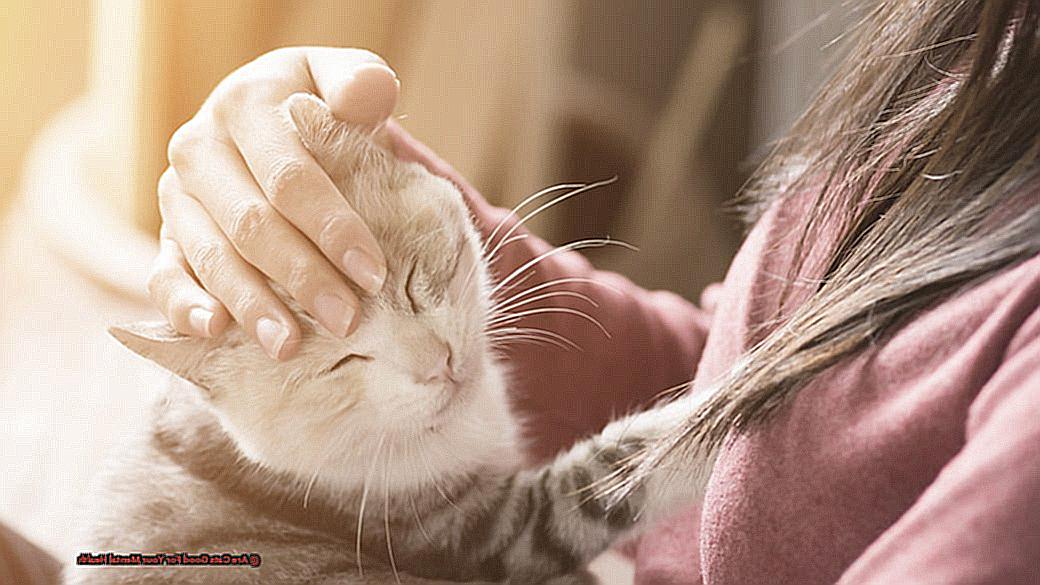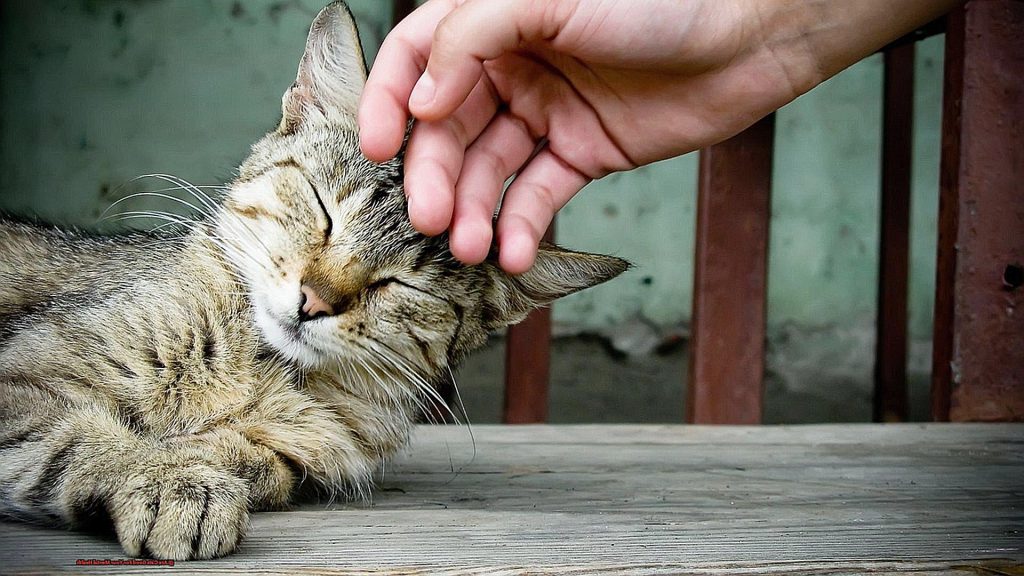Close your eyes and picture a cat.
Contents
Do you see their soft fur, their curious eyes, or perhaps their playful pounce? Now, imagine that same cat curled up on your lap, purring contently as you stroke their back.
Feels nice, doesn’t it? Well, what if I told you that this simple act of petting a cat could actually have a powerful impact on your mental health?
It may sound too good to be true, but the truth is that cats can be incredibly beneficial for our well-being. So let’s dive into the question at hand: are cats truly beneficial for our mental health?
So grab your favorite feline friend and let’s explore the amazing ways they can improve our overall well-being.
Are Cats Good For Your Mental Health?
If you’re a cat owner, you probably already know the joy and comfort that comes with having a furry feline friend by your side. But did you know that owning a cat can also have positive effects on your mental health? That’s right – studies have shown that these independent and often aloof creatures can actually provide a sense of companionship, reduce stress levels, and even improve mood. Let’s take a closer look at the mental health benefits of owning a cat.
Companionship and Emotional Support
Cats may have a reputation for being independent, but they are also incredibly loving and affectionate towards their owners. This unconditional love and companionship can provide a sense of comfort and reduce feelings of loneliness and isolation, which are common in individuals struggling with mental health issues. Simply having a cat by your side can make you feel less alone and provide a source of emotional support.

Stress Reduction
The act of petting a cat has been shown to release oxytocin, the “love hormone” that helps reduce stress and anxiety. Additionally, the rhythmic sound of a cat’s purring has a calming effect on the human brain, promoting relaxation and reducing tension. This can be especially beneficial for individuals with anxiety disorders or high levels of stress.
Routine and Purpose
Taking care of a pet requires daily tasks such as feeding, grooming, and playing. This can help establish a routine and give a sense of responsibility, which can be particularly helpful for those dealing with depression or bipolar disorder. Having a daily purpose and something to look forward to can improve overall well-being and provide a sense of fulfillment.
Improved Mood
Interacting with pets, particularly cats, has been found to increase levels of serotonin and dopamine in the brain – neurotransmitters associated with feelings of happiness and relaxation. This can be especially beneficial for individuals with depression or other mood disorders. Simply spending time with a cat can boost your mood and make you feel happier.
Sense of Security
The presence of a cat in the household can also help improve mood and reduce anxiety. Knowing you have a companion to rely on can make individuals feel safer and less anxious, which is particularly important for those dealing with PTSD or other trauma-related disorders.
The Science Behind Cats and Mental Health
It all starts with the bond between a cat and its owner. Studies have shown that this relationship releases oxytocin, also known as the “love hormone,” which can help reduce stress and promote feelings of happiness and relaxation. So the next time your cat curls up on your lap or rubs against your leg, know that they are not only showing affection, but also helping to boost your mood.
But that’s not all – interacting with cats through play or petting can also stimulate the release of endorphins, natural painkillers and mood enhancers. It’s no wonder that spending time with our furry companions can leave us feeling calmer and more content.
And let’s not forget about the power of a cat’s purr. Did you know that their signature sound has been linked to stress relief? The frequency of a cat’s purr has been found to have a therapeutic effect on both humans and other animals, promoting relaxation and improving emotional well-being.
But the benefits of owning a cat go beyond just physical and emotional well-being. Research has also shown that having a cat can help improve social skills and decrease social isolation. Cats can serve as a conversation starter and provide a sense of connection with others, making them great companions for those who may struggle with social interaction.
Furthermore, caring for a cat can give individuals a sense of purpose and responsibility, which can be especially beneficial for those dealing with mental health issues. Taking care of another living being can provide a sense of structure and routine, helping to improve overall well-being.
How Cats Help Reduce Stress and Anxiety
How Cats Help Reduce Stress and Anxiety
Are you feeling stressed, anxious, or overwhelmed? If so, owning a cat might be just what you need. Cats are more than just adorable companions – they have therapeutic benefits that can help reduce stress and anxiety levels.
Here’s how our feline friends can provide a much-needed sense of calm and comfort in our hectic lives:
Release of Oxytocin
Did you know that interacting with cats can release oxytocin in our bodies? Oxytocin is a hormone that promotes relaxation and reduces stress hormones like cortisol. So the next time your cat rubs against your leg or curls up in your lap, remember that their presence is helping to lower your stress levels.
Coping with Anxiety
Cats are known for their independent and low-maintenance nature, which can provide a sense of reassurance and stability for individuals struggling with anxiety. Their predictable routines and calming presence can offer a much-needed sense of control in an otherwise chaotic world.
Soothing Effects
The sound of a cat’s purring has been found to have therapeutic benefits, reducing feelings of loneliness and promoting feelings of comfort and contentment. It’s no wonder that many people find the sound of their cat’s purring to be incredibly soothing and relaxing.
Lower Blood Pressure and Heart Rate
Petting a cat has been linked to lower blood pressure and heart rate, as well as increased levels of serotonin – a neurotransmitter that helps regulate mood and behavior. Taking a few minutes to sit and pet your cat can not only provide a break from the stressors of daily life but also have positive physical effects on your body.
Distraction from Stressful Thoughts
Playing with a cat or simply watching them explore their surroundings can offer a much-needed distraction from stressful thoughts or situations. Cats have a way of capturing our attention and providing us with a mental break from our worries.
Sense of Purpose and Companionship
Caring for a cat can give individuals a sense of purpose and responsibility, providing a positive outlet for their energy and emotions. Having a furry friend to come home to can also provide a sense of companionship and reduce feelings of loneliness.
Ideal for Social Anxiety
For those struggling with social anxiety, cats can be the perfect pet. They offer unconditional love and support without the pressure of social interaction, making them great companions for introverted individuals.
The Role of Oxytocin in Cat-Human Bonding
We all know the joy and love that our furry companions bring to our lives. But did you know that there is a scientific explanation for this bond? It’s all thanks to oxytocin – the “love hormone” that plays a powerful role in cat-human bonding.
But what exactly is oxytocin and how does it affect our mental health and relationships with our feline friends? Let’s dive deeper into this topic and discover the amazing benefits of oxytocin in cat-human bonding.
What is Oxytocin?
Oxytocin is a hormone that is often referred to as the “love hormone” or “cuddle chemical.” It is released by the pituitary gland in our brains during moments of social bonding, such as hugging, cuddling, or even playing with our cats.
Its role in Cat-Human Bonding
Studies have shown that interacting with animals, particularly cats, can also trigger the release of oxytocin in humans. This hormone has been linked to reducing stress and anxiety levels, increasing feelings of trust and empathy, and promoting overall well-being.
In fact, a study conducted by researchers at Washington State University found that just 10 minutes of interacting with cats led to a significant decrease in cortisol levels (a stress hormone) in participants. This suggests that having a cat as a companion can have a positive impact on our mental health by promoting the release of oxytocin.
The bond between cats and their owners has also been linked to the release of oxytocin. A study published in the Journal of Veterinary Behavior found that owners who reported stronger bonds with their cats had higher levels of oxytocin in their urine samples. This suggests that the more we interact and bond with our cats, the more oxytocin is released, leading to increased feelings of love and attachment.
Social Support and Oxytocin
Another interesting aspect of oxytocin in cat-human bonding is its role in social support. Studies have shown that oxytocin can promote feelings of social connectedness and reduce feelings of loneliness and isolation. For individuals who may struggle with social interactions, having a cat as a companion can provide a sense of companionship and support, leading to increased levels of oxytocin and overall improved mental health.
This is particularly important during times of stress or when going through difficult life events, as having a cat by your side can provide comfort and support.
Routine and Responsibility: How Cats Improve Mental Well-Being
From promoting routines and responsibility to providing companionship and laughter, cats have a unique ability to improve our mental health in various ways.
- A Sense of Routine: Studies have shown that having a daily routine can greatly improve mental health. And what better way to establish a routine than with a cat? These creatures thrive on structure and schedules, making them the perfect motivators for us to stick to our own routines.
- Responsibility and Purpose: Taking care of another living being can give us a sense of purpose and accomplishment, which can boost self-esteem and overall well-being. Whether it’s feeding, grooming, or playing with our cats, these daily tasks can give us a sense of importance and responsibility.
- Companionship: The bond between a cat and its owner is truly special. The unconditional love and support from our pets can provide comfort and reduce feelings of loneliness or isolation. This is especially beneficial for individuals who live alone or have limited social interactions.
- Stress Reduction: The calming presence of a cat can help reduce stress and anxiety. Petting a cat has been linked to the release of oxytocin, a hormone that promotes relaxation and reduces blood pressure. Plus, the rhythmic sound of a purring cat has a therapeutic effect on humans.
- Physical Activity: Cats may be known for their lazy naps, but they also encourage their owners to engage in physical activity. Whether it’s playing with them or chasing after them around the house, regular exercise has numerous benefits for mental health, including reducing symptoms of depression and anxiety.
- Structure: Cats have specific needs that require attention, such as feeding, playtime, and litter box cleaning. By taking care of these tasks, our cats can provide structure to our day, which can be especially helpful for individuals who struggle with managing their time or staying organized.
- Joy and Laughter: Last but certainly not least, cats offer an endless source of entertainment and laughter. The joy and humor that they bring into our lives can help us cope with stress, boost our mood, and improve overall well-being.
Petting, Playing, and Training: Activities That Boost Cognitive Function
Here, we will explore how activities such as petting, playing, and training your cat can boost cognitive function, reduce stress and anxiety, and promote a sense of purpose and connection.
The Power of Petting
Have you ever noticed how relaxed you feel when petting your cat? It turns out that this simple act has a profound impact on the body and mind. Studies have shown that the repetitive motion of stroking a cat can help lower blood pressure, reduce stress and anxiety, and even release oxytocin, the “feel-good” hormone. This can be particularly beneficial for individuals with mental health conditions such as depression or PTSD.
The Joy of Playtime
Playing with your cat is not only fun but also has positive effects on cognitive function. The interactive and stimulating nature of playtime can improve memory, focus, and problem-solving skills. It can also provide a sense of purpose and accomplishment, which can be beneficial for those struggling with low self-esteem or motivation. So next time your cat brings you their favorite toy, don’t hesitate to engage in some playtime together.
Training for Mindfulness
While training cats may not be as common as training dogs, it can still have significant benefits for mental health. The process of teaching a cat tricks or commands requires patience, consistency, and attention to detail. These skills can translate into everyday life, promoting mindfulness and improving cognitive function. Plus, seeing your feline friend master a new skill can bring a sense of pride and accomplishment.
The Therapeutic Presence of Cats
Even if you’re not actively petting or playing with your cat, simply having them around can provide mental health benefits. Cats are known for their calming presence, and their purring has been shown to have a therapeutic effect on humans. They can also provide companionship and reduce feelings of loneliness or isolation, which can be particularly helpful for those with mental health conditions.
Special Considerations for Individuals with PTSD or Other Mental Health Issues
Studies have shown that pets, particularly cats, can have a profound effect on individuals with PTSD. One study published in the Journal of Traumatic Stress found that individuals with PTSD who had a service dog showed significant improvement in their symptoms compared to those without a service dog. Similar results have been found in studies on individuals with other mental health disorders, such as depression and anxiety.
So how exactly can our furry feline friends help those with mental health issues? For starters, cats provide comfort and companionship. They can be a source of emotional support for individuals struggling with symptoms such as flashbacks and nightmares. The presence of a cat can also help reduce feelings of loneliness and isolation, which are common among those with mental health issues.
But perhaps one of the most remarkable things about cats is their ability to sense when their owners are in distress. Cats are incredibly intuitive creatures and will often provide physical comfort by purring or snuggling up to their owners when they are feeling anxious or upset.
In addition to these emotional benefits, the responsibility of caring for a cat can also provide a sense of purpose and routine for individuals with mental health issues. This can be especially beneficial for those struggling with depression. The simple act of feeding, grooming, and playing with your cat can give you a sense of accomplishment and fulfillment.
However, it’s important to note that every individual’s experience with mental health is unique, and not all individuals may find cats to be helpful in managing their symptoms. It’s crucial for individuals to consult with their healthcare providers before adopting a cat as a form of therapy for their mental health. Additionally, proper training and support should be provided to ensure the safety and well-being of both the individual and the cat.
Conclusion
In conclusion, it is evident that cats are more than just adorable pets – they play a significant role in improving our mental health. Beyond the surface level of their cuteness, cats offer a multitude of benefits for our overall well-being.
Their presence alone can promote feelings of companionship and emotional support, which can be crucial for those struggling with loneliness or isolation. Additionally, through the release of oxytocin – known as the “love hormone” – and their soothing purring, cats have a unique ability to induce relaxation and reduce anxiety.
Not only do they provide comfort and companionship, but cats also offer a sense of routine, responsibility, and purpose. Daily tasks such as feeding and grooming them can give us a sense of structure and fulfillment, which can be especially beneficial for individuals with mental health issues.
Furthermore, interacting with cats through activities like petting, playing, and training can enhance cognitive function and promote mindfulness. For those dealing with PTSD or other mental health conditions, having a furry companion by their side can provide comfort during difficult times.






